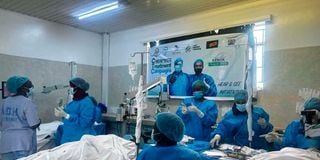Free eye consultations, cataract surgeries for Nairobi residents

Dr Brenda Walaba, the chief county ophthalmologist in Nairobi, with a team of doctors at Mbagathi Hospital where they conducted 96 successful free eye cataract surgeries in three days.
What you need to know:
- A cataract is the opacification of one’s natural lens in the eye. It is the second leading cause of visual impairment worldwide.
- As of October 2022, it was estimated that 94 million people were visually impaired globally due to cataracts, a majority being in developing countries.
A city hospital is offering free eye consultations and cataract surgeries following a surge in cataract related complications in Nairobi.
Mbagathi Hospital has so far conducted 96 successful free eye cataract surgeries, according to Dr Brenda Walaba, the chief county ophthalmologist in Nairobi County.
“There are so many Kenyans in the capital and its environs who are visually impaired due to cataracts,” she said.
She noted that a cataract is the opacification of one’s natural lens in the eye. It is the second leading cause of visual impairment worldwide.
“As of October 2022, it was estimated that 94 million people were visually impaired globally due to cataracts, a majority being in developing countries,” she noted.
The expert noted that vision impairment severely impacts quality of life.
“This week (last week) we performed surgeries on 30 patients on Monday, 26 on Tuesday and 40 on Wednesday. Most of these people cannot afford the sight restoring cataract surgery due to high cost, which means that there’s need to ensure that this service is available in government hospitals at an affordable cost to enable more Kenyans to benefit,” Dr Brenda said.
She further highlighted that cataracts pose an enormous global financial burden; with an estimate annual global productivity loss of about US$411 billion purchasing power parity. “The good news is that most of the causes of visual impairment can be treated and reversed with timely intervention. With surgery, patients with cataracts can have their vision restored and that is what we will be doing for the next few weeks for free.”
Most cataracts develop in adults, but they occasionally occur in infants and young children or as a result of trauma or medications
“Most patients we have seen during screening and surgery don’t know that something can be done about it while those who know that they need the surgery cannot afford it,” Dr Brenda told Healthy Nation.
The free screening and surgeries is in collaboration with CharityVision, a non-profit organisation focused on improving eye care and vision health.
According to Dr Walaba, a cataract is a condition characterised by the clouding of the eye’s lens.
“This common issue often develops in later stages of life and, although it may begin as a minor concern, it tends to progress gradually over time. While early stages of cataracts can sometimes be managed with prescription glasses, surgical intervention often becomes necessary as the condition advances. Cataract surgery, despite its initial impression, is a routine procedure with a high rate of success,” she explained.
The symptoms include blurred vision, difficulty focusing on nearby objects or when reading, glare sensitivity: increased sensitivity to sources of glare such as headlights while driving at night, altered colour perception: bright colours may appear muted and less vivid than usual and reduced visual clarity for close activities like sewing or reading may require more light than before.
The doctor clarified that cataracts are not growths or tumours as they are sometimes misconceived to be. “In fact, many cataracts are not visibly detectable to the naked eye.”
“Cataracts frequently correlate with the aging process, typically emerging in individuals aged 40 and above. The lens of the eye is composed of proteins, and the development of cataracts occurs when these proteins begin to aggregate,” an official brief from Mbagathi hospital highlighted, noting that in addition to the natural aging process, cataracts can arise from various other factors: eye trauma and surgical procedures, obesity, hypertension, excessive alcohol consumption, hormone replacement therapy, prolonged exposure to ultraviolet light such as sunlight as well as inadequate nutrition and smoking.
According to Dr Walaba, understanding the causes of cataract formation is vital in promoting awareness and adopting preventive measures.
“As the cloudy lens is removed, individuals often experience a significant improvement in their vision and overall quality of life. By addressing cataracts through timely intervention and informed medical care, individuals can restore their visual clarity and continue to enjoy their daily activities with improved vision”.
She highlighted that while cataracts are a natural outcome of aging, adopting a healthy lifestyle can play a role in prevention.
“While a completely cataract-free future isn’t guaranteed, a well-balanced approach can improve your chances. Dietary choices can contribute to lowering the risk of cataracts. Although they can’t entirely eliminate the possibility, incorporating a diverse diet rich in healthy omega-3 oils found in sources like oily fish, walnuts, flax seeds, and leafy vegetables can be beneficial.
She added that increasing your intake of vitamin E from foods like cereals, nuts, and seeds may prove helpful.
“In addition to dietary considerations, safeguarding your eyes from the sun is a proactive step in either preventing or slowing down cataract development. Smoking cessation is also strongly advised by medical professionals to reduce the risk of cataract progression.”
“For maintaining optimal eye health, regular eye exams by a specialist are crucial. These evaluations can help catch potential issues early and ensure that any necessary interventions are promptly administered,” the hospital notes.
A definitive solution for cataracts lies in surgery, a widely practised and generally uncomplicated procedure made possible by medical advancements, which involves the removal of the clouded eye lens (cataract) and the insertion of an artificial lens known as an intraocular lens, said Dr Walaba.





